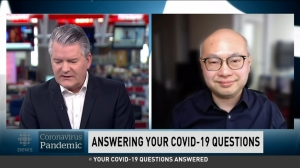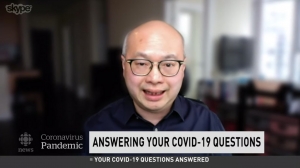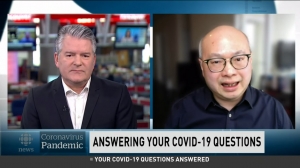During the COVID-19 pandemic, media across North America have been turning to PostScript Magazine columnist Dr. Roger Wong for expert advice on how seniors can get through this health crisis. In addition to his recent editorial in The Globe and Mail, Dr. Wong has been interviewed by numerous media outlets, including The New York Times, Britain’s Daily Mail, National Post, Global News, CTV News and CBC. This article is adapted from a conversation Dr. Wong had with CBC’s Mike Killeen.



What special protection steps should we take for seniors?
First of all, we need to understand that seniors are more at risk and vulnerable for developing infections, including COVID-19. In part that’s because immune system function in seniors may not be working as well, and there are many seniors who live with long-standing health conditions.
Those with diabetes, heart disease and lung disease, for example, are predisposed to getting more infections including COVID-19. So it is important to remember what we can do to protect seniors.
Here are five tips on what we can do.
The first tip is to remember is good hygiene, washing your hands and keeping very good personal hygiene. That is true for everybody, particularly for seniors.
A second tip is for all of us who want to visit our seniors to do so virtually, rather than in person during the outbreak.
A third tip is to make sure seniors have adequate access to food and to medications.
The fourth tip is to make sure that physical distancing is practiced. For instance, buy groceries first thing in the morning rather than during a busy period. And when picking up medications, call in first or have someone pick them up. There are a good number of supermarkets and pharmacies with dedicated times for seniors, which is excellent.
The fifth tip is to remember that physical distancing does not mean social isolation, because we know that loneliness and social isolation can have negative impacts on seniors’ health. So while we are practicing physical distancing to protect seniors, we must also be regularly interacting with them, through computer technology, social media, or if they prefer, by telephone.
Many seniors use technology, but some don’t.
A simple phone call can be very helpful for seniors who do not have access to apps and devices. The pandemic situation right now is unprecedented. That simple outreach becomes especially important for seniors who live with dementia, such as Alzheimer’s disease, because they may not understand what is going on. For them, we have to keep our message very simple. We may need to repeat it by saying, “we love you very much, this is a very different time now, we are protecting you, you are in a safe place, and we will be talking over the telephone more often.”
For those on social media, it is a good time to electronically share photo albums, you can go over virtually the old photos together, which is good social engagement.
How about a short visit from the grandchildren, if we are all healthy? We really miss them.
That’s an excellent question. We need to remember that seniors can get COVID-19 through one of two ways.
The first way involve seniors who are mobile, they may get the infection when they are out in public places, such as on public transportation, and when they come into contact with the virus.
But the second way seniors can get infection is through other people transmitting the infection to them. And oftentimes, people who are spreading the virus may not have symptoms. Now that we have this extended time when children are out of school, many seniors, understandably, would like to contribute to the family by caring for the children. But I would advise against doing this unless the senior has already been a part of your household. I would advise to use technology to keep the generations connected. Have a Skype call from one household to another.
Here’s another question. I’m in my late 60s, should I avoid going out to the grocery store and the pharmacy?
Well these are basic needs. My advice to older adults is to try to go during off-peak hours, such as first thing in the morning, A number of pharmacies and supermarkets have dedicated their early morning operating hour for seniors and those who are vulnerable to developing the infection. I really think this should be applauded.
How can I care for a senior spouse with COVID-19 at home and at the same time protect myself?
This is a difficult situation and there are two aspects to this. First is the physical aspect of providing care and then secondly the psychological or mental health aspect.
Let me start with the challenges from the physical point of view. It is important to remember that for care providers to someone who has COVID-19, that they must first of all protect themselves, because otherwise, if they also fall sick, then the situation could get much worse. So that means wearing personal protective equipment, meticulous hand washing and personal hygiene, and also having some form of physical isolation even within the same household. For example, use a different room for the person that has COVID-19 and then the caregiving spouse stays in a different room.
During mealtimes, avoid eating at the same table. This is also difficult because mealtime is the time for socialization, but as I mentioned before, use technology or virtual means whenever possible.
There’s a lot of psychological stress going on right now—it’s a very difficult time but particularly when your spouse gets sick, you feel the double burden of providing care and concern about the outcome of their disease. You may even feel guilty and say to yourself, “why is it that I am feeling well and my spouse is not?”
This is a stressful situation and it is really important to talk to someone. Talk to your family, neighbours, or anyone who can offer emotional support and practical help.
In BC we also have the 211 telephone line which offers expanded support during COVID-19. This is a fantastic resource to provide connections to seniors who are in need of support during the outbreak. People on the 211 line can talk to your about both physical and mental health needs. As well, many of my medical students at UBC’s Faculty of Medicine are working on initiatives to support those seniors affected who may not have access to food or medication delivery.
What about seniors’ residences where up to 50 people are eating together, four to a table?
We need to remember that seniors who are residing in care homes or long-term care, are our most vulnerable to developing COVID-19. They may have difficulty walking, and some of them may live with dementia or Alzheimer’s disease.
Knowing the level of care residents in care homes need is really important. Everyone who provides care to these residents must wear personal protective equipment and practice meticulous hand and personal hygiene. That includes protection of residents who are ill with COVID-19 so that there’s no cross infection. A lot of times we need to remember that keeping the physical distance within care homes may not be easy. It really depends on the physical layout of the homes.
We want to guard against social isolation as well. Remember physical distancing does not mean social isolation. We should use technology to virtually connect with seniors in care homes – this is the compassionate thing to do.
We are vulnerable and immune compromised. Sometimes we walk our dog. Is it safe to walk our dog?
First, I would say that physical distancing basically means maintaining a minimum distance of two metres or six feet between any two people, in order to protect ourselves from getting COVID-19.
This also means that we stay home as much as possible and try to minimize the amount of time we spend outside of home. It is fine for us to modify our exercise or walking routine with our pets while keeping the physical distance from others while outdoors. I would suggest going during off hours when there are not too many other walkers around. Go as one or two people at a time, always keeping that physical distance of two metres apart.
I have a loved one with a heart condition and diabetes, how long should I stay away from them during this time?
Seniors who are immunosuppressed, meaning their immune system not working as well, are more at risk for developing COVID-19. We therefore need to protect them for as long as COVID-19 is prevalent in the community. So I would recommend exercising caution and protection for some time to come.
Should senior caregivers and individuals be wearing protective gear?
In your own home, there is no reason to be wearing personal protective equipment, except when providing health care to someone with COVID-19. In British Columbia, all health care providers must wear personal protective equipment during all direct patient care encounters. This requirement also applies to workers in care homes.
Is it safe for seniors to order food from delivery services?
For many seniors, food delivery or grocery delivery or medication delivery is an important help during this time when people are trying to maintain a physical distance.
Delivery service is reasonably safe, especially when it is contactless (for example, leaving the product at the front door), and provided that the moment after you have taken in the product delivered, make sure to immediately wash your hands.
Dr. Roger Wong, thanks so much for your time this afternoon. We really appreciate it.
Thank you very much.
More links from Dr. Roger Wong on the COVID-19 crisis and seniors:
- NEW UBC Pathways Magazine Special Edition: COVID-19 and Seniors’ Health
- Dr. Wong’s Globe and Mail article “Removing Seniors From Care Homes is Not the Solution”
- Dr. Wong’s TedX Vancouver talk on Keeping Seniors Safe in Their Own Homes
- UBC article and video on supporting seniors during Covid crisis
- PostScript Magazine, where Dr. Wong is a regular columnist

Dr. Roger Wong is Executive Associate Dean (Education) in the Faculty of Medicine, University of British Columbia, a geriatrics specialist doctor, clinical professor of geriatric medicine, the 13th President of the Canadian Geriatrics Society, and a TEDx speaker. He tweets at @RogerWong10.
The content of this article is not intended to be a substitute for professional medical advice, diagnosis, or treatment. Always seek the advice of your doctor or other qualified health provider with any questions you may have regarding a medical condition.


